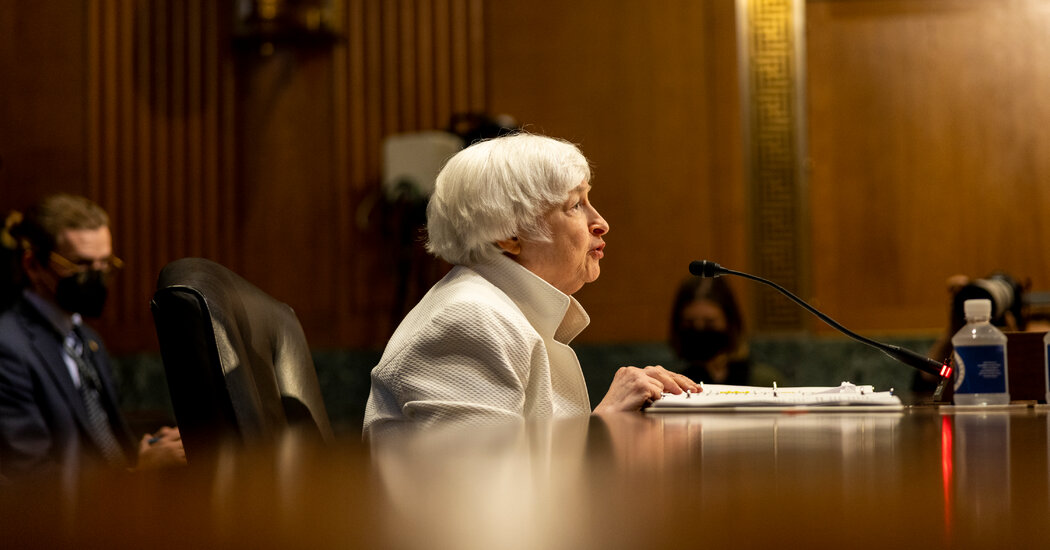Advertisement
Supported by
The Financial Stability Oversight Council said that the growing crypto market could pose risks to the broader financial system.
Send any friend a story
As a subscriber, you have 10 gift articles to give each month. Anyone can read what you share.
A federal panel responsible for monitoring financial system risks sounded a warning on Monday about cryptocurrency markets, saying that the widespread adoption of digital assets poses risks if the market continues to grow without better oversight and enforcement.
It is the first major report on cryptocurrencies by the Financial Stability Oversight Council, which is led by the Treasury Department and was created after the 2008 financial crisis to help identify and mitigate threats to the financial system.
“The scale of crypto-asset activities has increased significantly in recent years. Although interconnections with the traditional financial system are currently relatively limited, they could potentially increase rapidly,” the report said.
Concerns about vulnerabilities in the crypto markets have become more pronounced in recent months, in the wake of wild swings in price and serious losses in the industry. In May, the collapse of a single asset led to a downward spiral in prices throughout crypto markets, prompting a rash of bankruptcies, consolidation and layoffs in the industry, and leaving many investors stranded, unable to access their assets.
When the cryptocurrency market exploded and reached about $3 trillion in value around this time last year, officials feared that rampant speculation and insufficient oversight of digital asset activity could infect the wider system and called for an assessment. Although about $2 trillion in value has been wiped out since then, the risks are no less pressing now.
A Treasury spokesman said that recent volatility has highlighted the need for more action.
The panel, which includes the leaders of all U.S. banking and financial agencies, repeatedly emphasized that existing laws already cover many of the activities in crypto markets. The report urged all agencies, including the Securities and Exchange Commission and the Commodity Futures Trading Commission, to prioritize crypto enforcement and recommended that Congress provide regulatory agencies with more resources to police crypto.
The report also outlined gaps where regulators say more legislation is needed, particularly for issuers of a type of digital asset known as a stablecoin.
Stablecoins are cryptocurrencies ostensibly pegged to the value of a stable asset like the dollar that have sometimes proven wobblier than promised. Regulators have identified stablecoins as posing one of the most immediate risks to the broader financial system. Issuers are mostly overseen by state regulators under a range of regimes, yet stablecoins are a key bridge between new and traditional markets and volatility in crypto could lead to a bank run on these companies, potentially infecting wider markets.
The report also recommends legislation to increase oversight of crypto tokens like Bitcoin and Ethereum that don’t explicitly fall under the jurisdiction of the Securities and Exchange Commission or any other agency. A bill recently introduced by bipartisan members of the Senate Committee on Agriculture sought to address this gap by granting authority to the C.F.T.C. Treasury officials declined to endorse any particular legislation in a briefing with reporters, saying only that they are “heartened” by bipartisan efforts in Congress.
Regulators are also calling for new authority that would give Washington better visibility across the entirety of crypto businesses, including the ability to look at various, seemingly disconnected entities in order to better understand risks and conflicts. The report noted that “crypto-asset businesses do not have a consistent or comprehensive regulatory framework and can engage in regulatory arbitrage.”
The report calls on lawmakers to create new rules that address how crypto exchanges and platforms expand, noting that many add services by acquiring intermediaries without considering conflicts and limits on business overlaps that exist in traditional finance, raising stability risks and potentially hurting investors.
The report noted that certain characteristics of crypto have “acutely amplified instability” within the blockchain ecosystem, including lack of basic risk controls to protect against runs, excess availability of leverage and prices that swing quickly and “appear to be primarily driven by speculation rather than grounded in current fundamental economic use cases.” Regulators also fear that risky interconnections between crypto businesses and a few concentrated providers of key services undermine the ostensibly decentralized nature of blockchain.
“These vulnerabilities are partly attributable to the choices made by market participants, including crypto-asset issuers and platforms, to not implement or refuse to implement appropriate risk controls, arrange for effective governance, or take other available steps that would address the financial stability risks of their activities,” the reports states.
Treasury Secretary Janet L. Yellen, who chairs the panel, said in a statement that the report “provides a strong foundation for policymakers as we work to mitigate the financial stability risks of digital assets while realizing the potential benefits of innovation.” Officials hope the publication will serve as a guide for lawmakers and regulators as they develop a more comprehensive regulatory framework for crypto markets.
The government, unlike the crypto industry, doesn’t tend to move quickly, but the report, which outlines both general principles and specific remedies, is a significant step, industry observers said.
In it, the F.S.O.C. recognizes the increasingly centralized nature of an industry that promotes decentralization and provides some of the clarity that blockchain businesses have been clamoring for, said Eswar Prasad, a Cornell University professor and author of “The Future of Money,” who engaged with regulators as they put together the report. “It certainly moves us forward.”
Advertisement
Author
Administraroot


